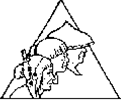First posted 06:43am (Mla time) Aug 07, 2006
Inquirer
http://news.inq7.net/archive_article/index.php?ver=1&index=1&story_id=13863
Editor's Note: Published on page A18 of the August 7, 2006 issue of the Philippine Daily Inquirer
PUERTO PRINCESA CITY -- A single drop of water does not only give hope but is also a powerful instrument to unite people around the world.
The remark came from Filipino-American Gemma Bulos, founder of A Single Drop (ASD), a US-based non-government organization helping communities have access to safe drinking water by promoting a water filter that uses only cheap materials, such as gravel and sand.
Bulos said she believed in water as an equalizer of life, owing to the fact that all living things -- of any kind and of status in life -- need water in order to live.
“With equality, there will be unity, with unity there is peace,” she claimed.
With the Philippines being rich in water resources, Bulos believed that problems steaming from lack of water should be addressed simply by tapping available resources.
By using cheap materials, Biosand makes safe drinking water accessible to the poor.
The Biosand filter is being pilot tested in Quezon, Roxas and Brooke’s Point.
Palawan was chosen as one of the pilot areas because the community members themselves wanted potable water and the residents were willing and cooperative.
The installation and construction of the filter were still in process.
The Biosand filter is like a traditional slow sand filter being used in most commercialized water purifiers.
“It is simply a concrete container, with layers of sand and gravel inside it. The sand and gravel remove dirt, bacteria, viruses and parasites and other impurities from the water,” Bulos claimed.
The Biosand filter, she said, removes more than 90 percent of fecal coliform, 100 percent of protozoa and helmints, 50 to 90 percent of organic and inorganic toxicants, and up to 67 percent of iron and manganese. It also removes most suspended sediments in water.
The “affordable, simple and sustainable” filter, which can “produce up to 60 liters of filtered water per hour,” could be used for many years, according to Bulos.
The ASD has gained approval and support from the Department of Health.
With the technology having passed through several scientific testing, Bulos looked forward for support from local government units that would make the technology acceptable to local communities.
A Single Drop reached Puerto Princesa last June through a workshop hosted by the Palawan NGO Network Inc. and co-sponsored by the Women’s Global Green Action Network, while the Center for Affordable Water and Sanitation Technology provided the trainers.
Bulos said the filter is easy to build as done by the participants in the workshop that brought together 18 persons from different towns in Palawan during the first set of workshops and 27 participants in the second set.
She said the filter would not directly compete with commercial water purifier traders as it is intended for the poor or “those who wouldn’t buy bottled water.”
“The Biosand technology also gives health workers an opportunity to go and speak up to the household level to tackle about hygiene,” she said.
The Palawan NGO Network Inc., the partner NGO of A Single Drop, said the latter will open its office in Puerto Princesa City this month to make the product more accessible to the poor.
Jofelle Tesorio, PDI Southern Luzon Bureau
Monday, August 07, 2006
Subscribe to:
Post Comments (Atom)

No comments:
Post a Comment